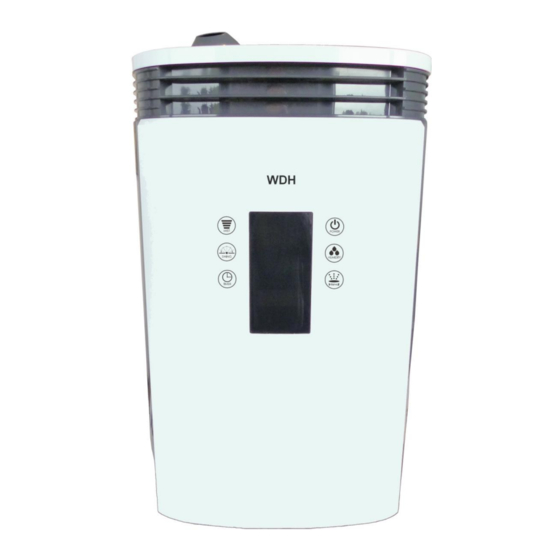Aktobis WDH-MG1 Handbuch - Seite 8
Blättern Sie online oder laden Sie pdf Handbuch für Befeuchten Aktobis WDH-MG1 herunter. Aktobis WDH-MG1 10 Seiten.

Other
Humidifier for a better climate and for the benefit of health
Especially during the heating season, the relative humidity often falls below the recommended range for living and
working spaces. This has an unfavourable effect on the well-being and health of people and animals and can also
promote diseases of the respiratory system if the indoor air is permanently very dry. A too dry climate can also be
harmful for inventory and plants. This effect can be counteracted with our humidifier.
In the field of human medicine, a balanced humidity of the ambient air is recommended. However, especially in
closed, poorly ventilated and well-heated rooms, such values are often fallen short of, which can lead to reduced
respiratory performance and impairment of the skin or mucous membranes. This is especially the case in winter, as
the cold outside air then has only a low absolute humidity. Therefore, it should be re-humidified by a humidifier after
it has been warmed up to room temperature in order to prevent the relative humidity from dropping too much.
In very cold regions or at cold times of the year or at night, the human organism often shows an increased fluid
consumption, although the opposite should rather be assumed due to the lack of fluid loss through sweating. This is
due to the humidification of the dry inhaled air and the associated loss of water. If the cold outside air is heated
during inhalation, its water vapour capacity increases and thus also lowers the relative humidity. In contrast, the
saturation deficit increases and the tendency of the liquid lung tissue water to change into the gaseous aggregate
state increases. In summer or when the ambient air is warm, the inhaled air is hardly warmed up any further and
therefore retains its usually high relative humidity. If the additional water losses through sweating are not too great
here, the body's water requirement is therefore higher in cold ambient conditions.
Increased humidity is beneficial for breathing, as oxygen then reaches the bloodstream more easily via the alveoli.
The skin needs a high level of humidity in order not to dry out, as this is closely linked to skin moisture. Mucous
membranes are particularly susceptible to drying out, as they have little protection against evaporation and depend
on their high humidity to maintain their functions. Thus, low humidity of the nasal mucosa can result in an increased
incidence of nosebleeds. In general, the skin's immune defence is weakened (increased risk of catching a cold)
and its ability to exchange substances is reduced, which particularly affects the oral mucosa. Low humidity also
increases the susceptibility to skin irritations or redness or even skin inflammations.
Source:
www.wikipedia.de
Aktobis AG, Borsigstr. 20, D-63110 Rodgau / Germany
www.AKTOBIS.de
Email: [email protected]
